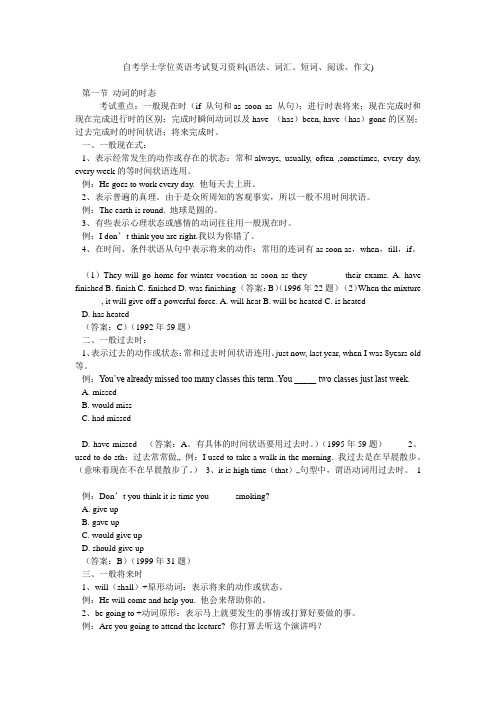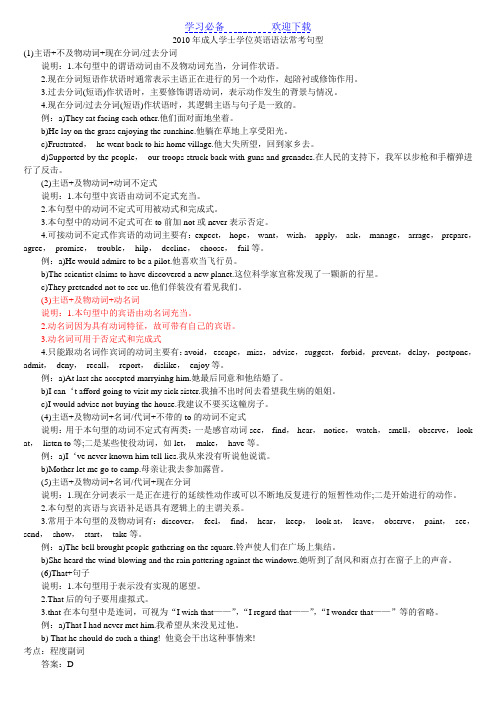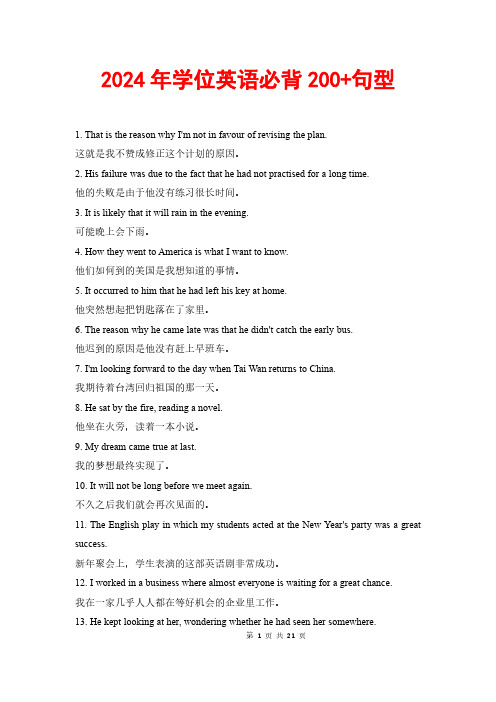历年学位英语词汇语法常考句型(必背)
学位英语关键句型及重点句型(通过必备)

学位英语·常考重难点句型一、英语中构成疑问句(除对主语或主语之定语提问的特殊疑问句外),通常须使用倒装结构,这是语法结构的需要。
例如:1.When are we going to drink to your happiness?我们什么时候喝你们的喜酒?2.Have you seen the film?你看了那部电影吗?3.Have you anything like that?在美国英语中常见:Do you have anything like that?你有那样的东西吗?二、以副词here,there,off,out,away等开头的句子,主要是表示感叹语气的句子,当其主语为名词时,通常要使用倒装。
例如:4.Here comes our teacher!我们的老师来了!5.Away went the boy to the school!那男孩子到学校里去了!6.Off goes the woman!那个女人走了!三、当构成关联从属连词so...that的so位于句首时,往往要使用倒装结构。
例如:7.So loudly did the students read that people could hear them out in the street.同学们大声读书,人们在街上都听得见(他们的读书声)。
8.So small were the words that he could hardly see them.字那么小,他几乎看不见。
四、以引导词there开头的句子,须使用倒装结构。
例如:(A)表示“……有……”之概念的“There+be+主语”结构:9.There are three books on the desk.桌上有三本书。
10.There were something in the box.箱子里有东西。
(B)用于正式文体,特别是文学作品中的"there+不及物动词十主语"结构,当主语不明确而又是一个很长的名词短语时,往往使用这种结构:11.There entered a strange little man.走进来一个奇怪而身材又矮小的人。
自考学士学位英语考试复习资料(语法词汇短词阅读作文)

自考学士学位英语考试复习资料(语法、词汇、短词、阅读、作文)第一节动词的时态考试重点:一般现在时(if 从句和as soon as 从句);进行时表将来;现在完成时和现在完成进行时的区别;完成时瞬间动词以及have (has)been, have(has)gone的区别;过去完成时的时间状语;将来完成时。
一、一般现在式:1、表示经常发生的动作或存在的状态:常和always, usually, often ,sometimes, every day, every week的等时间状语连用。
例:He goes to work every day. 他每天去上班。
2、表示普遍的真理。
由于是众所周知的客观事实,所以一般不用时间状语。
例:The earth is round. 地球是圆的。
3、有些表示心理状态或感情的动词往往用一般现在时。
例:I don’t think you are right.我以为你错了。
4、在时间、条件状语从句中表示将来的动作:常用的连词有as soon as,when,till,if。
(1)They will go home for winter vocation as soon as they ________their exams. A. have finished B. finish C. finished D. was finishing (答案:B)(1996年22题)(2)When the mixture ______, it will give off a powerful force. A. will heat B. will be heated C. is heatedD. has heated(答案:C)(1992年59题)二、一般过去时:1、表示过去的动作或状态:常和过去时间状语连用。
just now, last year, when I was 8years old 等。
成人学位外语词汇语法知识

成人学位外语词汇语法知识一、词汇部分。
1. abandon [əˈbændən] - 动词(v.)- 词义:放弃;遗弃;抛弃。
- 例句:He abandoned his car on the side of the road.(他把汽车丢弃在路边。
)- 搭配:abandon oneself to(沉溺于),例如:Don't abandon yourself to despair.(不要自暴自弃。
)2. ability [əˈbɪləti] - 名词(n.)- 词义:能力;才能。
- 例句:She has the ability to solve difficult problems.(她有解决难题的能力。
)- 搭配:to the best of one's ability(尽某人最大努力),例如:I will do it to the best of my ability.(我会尽我最大的努力去做。
)3. absent [ˈæbsənt] - 形容词(adj.)/动词(v.)- 作为形容词:- 词义:缺席的;不在场的。
- 例句:Several students were absent from class today.(今天有几个学生没来上课。
)- 作为动词:- 词义:使缺席;使不在。
- 例句:Love was totally absent from his childhood.(他童年时根本没有得到过爱。
)二、语法部分。
1. 时态 - 一般现在时。
- 构成:- 主语为第三人称单数(he/she/it等)时,动词一般加 -s或 -es,例如:He likes reading.(他喜欢阅读。
)- 主语为其他人称(I/you/we/they等)时,动词用原形,例如:We play football every Sunday.(我们每个星期天踢足球。
)- 用法:- 表示经常或习惯性的动作或状态,例如:She gets up at six every day.(她每天六点起床。
学士学位英语语法大全

2010年成人学士学位英语语法常考句型(1)主语+不及物动词+现在分词/过去分词说明:1.本句型中的谓语动词由不及物动词充当,分词作状语。
2.现在分词短语作状语时通常表示主语正在进行的另一个动作,起陪衬或修饰作用。
3.过去分词(短语)作状语时,主要修饰谓语动词,表示动作发生的背景与情况。
4.现在分词/过去分词(短语)作状语时,其逻辑主语与句子是一致的。
例:a)They sat facing each other.他们面对面地坐着。
b)He lay on the grass enjoying the sunshine.他躺在草地上享受阳光。
c)Frustrated,he went back to his home village.他大失所望,回到家乡去。
d)Supported by the people,our troops struck back with guns and grenades.在人民的支持下,我军以步枪和手榴弹进行了反击。
(2)主语+及物动词+动词不定式说明:1.本句型中宾语由动词不定式充当。
2.本句型中的动词不定式可用被动式和完成式。
3.本句型中的动词不定式可在to前加not或never表示否定。
4.可接动词不定式作宾语的动词主要有:expect,hope,want,wish,apply,ask,manage,arrage,prepare,agree,promise,trouble,hilp,decline,choose,fail等。
例:a)He would admire to be a pilot.他喜欢当飞行员。
b)The scientist claims to have discovered a new planet.这位科学家宣称发现了一颗新的行星。
c)They pretended not to see us.他们佯装没有看见我们。
(3)主语+及物动词+动名词说明:1.本句型中的宾语由动名词充当。
学位英语常考短语600个

学位英语常考短语600个1. abide by(=be faithful to ;obey)忠于;遵守。
2. be absent from…。
缺席,不在3. absence or mind(=being absent-minded)心不在焉4. absorb(=take up the attention of)吸引…的注意力(被动语态)be absorbed i n 全神贯注于…近be engrossed in ;be lost in ;be rapt in ;be concentrated on ;be focused on ;be centered on5. (be)abundant in(be rich in;be well supplied with)富于,富有6. access (to)(不可数名词)能接近,进入,了解7. by accident(=by chance,accidentally)偶然地,意外。
Without accident(=safely)安全地,8. of one's own accord(=without being asked;willingly;freely)自愿地,主动地9. in accord with 与…一致 . out of one's accord with 同…。
不一致10. with one accord (=with everybody agreeing)一致地11. in accordance with (=in agreement with)依照,根据12. on one's own account 1)为了某人的缘故,为了某人自己的利益2)(=at one's own risk)自行负责3)(=by oneself)依靠自己on account 赊账;on account of 因为;on no account不论什么原因也不;of …account 有………重要性。
成人本科学士学位英语考试词汇重点(打印版)

成人本科学士学位英语考试词汇重点1.a bide by( =be faithful to ; obey)忠于;遵守。
2.b e absent from⋯。
缺席,不在3.a bsence or mind( =being absent-minded )心不在焉4.a bsorb(=take up the attention of )吸引⋯的注意力(被动语态)be absorbed i n 全神贯注于⋯近 be engrossed in ; be lost in ; be rapt in ;be concentrated on ;be focused on ; be centered on5. ( be) abundant in(be rich in ; be wellsupplied with )富于,富有 6. access( to)(不可数名词)能接近,进入,了解7. by accident( =by chance, accidentally )偶然地,意外。
Without accident ( =safely )安全地,8. of one's own accord (=without being asked ;willingly ;freely )自愿地,主动地9. in accord with 与⋯一致. out ofone's accord with同⋯。
不一致10.w ith one accord ( =with everybody agreeing )一致地11.i n accordance with ( =in agreement with )依照,根据12. on one's own account 1)为了某人的缘故,为了某人自己的利益 2)( =at one's own risk )自行负责3)(=byoneself)依靠自己on account 赊账; on account of因为;on no account 不论什么原因也不; of ⋯ account 有⋯⋯⋯重要性。
学位英语考试复习语法

学位英语考试复习语法学位英语考试复习语法1.一般现在时可以代替将来时,用于时间和条件状语从句中。
例如:1)Return the book immediately to the library as soon as you __A___ it.A. finishB. are finishedC. have finishedD. are finishing2)Please be sure to telephone me the next time you _D____.A. will comeB. would comeC. shall comeD. come2.在“This is the first time…”结构中,后面的从句用现在完成时。
句子开头也可以用it代替this例:This is the first time that I have met Jane.3.在“It/This is +形容词最高级+名词后面的从句中,用现在完成时。
”例:This is one of the best books _A____ on the subject.A. that have ever been writtenB. which have ever been writtenC. that has ever been writtenD. whatever have been written4.在“It is/has been+时间段+since…后边用过去时。
”例:It has been twenty years since I left my hometown.5.在“no sooner…than”和“hardly… when…”结构中,主句部分用过去完成时,从句部分用过去时。
例如:1)I had no sooner returned than he called.2)We had hardly begun when we were told to stop.6.在“It is (high) time后边的从句中用过去时。
自考本科学士学位英语词汇及语法汇总(2)

自考本科学士学位英语词汇及语法汇总(2)1.语法考题的涉及面宽近年考题曾经考到:几乎所有词类,三种动词的非谓语形式,名词从句,形容词从句,副词从句,独立主格,一致,倒装,强调等基本语法知识。
2.语法考试的重点突出语法考试的重点为内容庞杂较难掌握的项目,这些项目还反复出现如:虚拟语气,状语从句,定语从句,独立主格,情态动词。
3.具体考查重点为以上项目中的特殊用法,不常用的情况1)虚拟语气的考点为:would rather+that从句+一般过去时: It is vital/necessary/important/urgent/imperative/desirable/advisable/natural/essential+that+动词原形;It is time/abouttime /hightime+that+一般过去时:proposal/suggestion+that+动词原形;lest+that+should+动词原形;if only+that+would+动词原形。
2)状语从句的考点为:非if引导的条件状语从句,此类句子多用 at times,provided,so long as,in case,once等来替代if;由 evenif/so,now that,for all等引导的让步状语从句;just/hardly…when引导的时间状语从句;more than,as…as,not so much as,the same as,as much as等引导的比较状语从句。
3)独立主格结构多以逻辑主语+分词的形式出现。
4)情态动词多与完成时形式连用。
5)定语从句重点考查介词+关系代词(which)和as作为关系代词。
4.词汇的考查重点为1)动词,名词与介词的搭配如:popular/patient+with; yield/solution/adapt/transfer/access+to;accuse/require+of;charge +for;under+discussion等等。
学士学位英语语法汇总

学士学位英语语法汇总一、非谓语动词—固定句型搭配1.动名词1.remember doing 记得做过某事2.remember to do 记得去做某事(事情还没有没有做)3.forget doing sth 忘记做过某事4.forget to do sth 忘记去做某事2.不定式find sb to do sth 找某人做某事see的宾语补足语是不带to的不定式,变为被动语态时,该不定式前要加towh-+to do(sth)在句中作主、宾、表、状语It will take sb(time)to do sth 做某事要花某人时间3.现在分词在with引导的独立主格结构中,主谓关系用现在分词介词后面要跟动名词做宾语,当动名词的动作发在谓语动词所表示动作之前时,要用动名词的完成时二、虚拟语气1.一般过去时表示对现在的假设(与现在事实相反)2.在It is/was+形容词+that从句中+should(可省略)+动词原形3.without引导虚拟语气,与现在事实相反,主句用一般现在时,would+动词原形4.混合虚拟语气,but后面表达的是真实情况5.It is(high)time+ that(该是……时候了)+一般过去时表示虚拟语气6.if从句中含有were,should,had时,将if省略把were,should或had移到句首7.表示与过去事实相反的虚拟句,用过去完成时,条件从句省略if,句子要倒装8.But for(要不是)虚拟语气,表示与过去事实相反用should/would/ have done sth9.表“建议、命令、要求、渴望”的动词所引导的宾语从句中,从句要用虚拟语气should+动词原形,且should可以省略10.Urgent 后的句子使用虚拟语气should+动词原形11.would rather(宁愿,真希望,宁可)+that从句,从句多用过去式表示虚拟语气12.in case引导的从句要用虚拟语气,结构是should(可省略)+动词原形13.wish(表示愿望)虚拟语气,与过去事实相反的愿望,用过去完成时14.insist+should+动词原形,表示虚拟语气三、强调与倒装1.强调it is+强调部分+that句型consider+it+adj.+that…结构中,it做形式主语认为……都it is/was +强调部分+that(who,whom)+…2.倒装(1)scarcely…when…几乎不(2)no sooner(一旦…立即)…than(3)neither,nor谓语句首时,部分倒装,把助动词放在情态动词前面(4)only+状语+主语半倒装(noly引导状语从句+从句语序不变,主语要倒装)(5)not until 在句首,句子要倒装(6)否定词hardly、scarcely、never、not、little等在句首,句子要倒装(7)So that句型中,so谓语句首时,句子需要倒装四、反义疑问句1.当陈述部分有“have to+v”动词时,提问部分应用助动词doesn‘t/did +主语’2.祈使句,以Don't 开头的反义疑问句,一般用will you3.表示否定意义的词never、seldom、hardly等,疑问部分则用肯定式五、主谓一致1.together with连同;加之(就远原则,谓语动词用单数)2.either A or B(要么…要么…),遵循就近原则六、情态动词1.must have done sth 对已经发生事情的肯定推测2.can't have done表示过去不可能做了什么3.could have done 本可以做某事(本来可以做而实际上没做某事)4.should have done 本应该做某事(本应该做而实际上没有做某事)5.should(not)have done 过去本(不)应该做某事6.may hanve done,也许(表示不确定的推测)7.ought to have done 表示本应该做而没有做七、定语从句(形容词性从句)as 引导定语从句时,可将形容词提前,句子用倒装,Busy as he wasthe same.that和……一样,(表同一个)the same..as和…一样,(表同一类)so…as像……那样的,(so修饰形客词)such…as像……那样的,(such修饰名词)定语从句,先行词是事物或动物时,应该用关系代词which 八、语态与时态以“by+将来时间”引导的表示将来的时间,后面用将来完成时As soon as 引导的从句通常用一般现在时表将来九、固定搭配As is known to all 众所周知had better (had best) do sth 最好做某事had better(had best)not do sth 最好不要做某事belong to 属于no part of the line 没有线的一部分regret(not)doing stn 后悔做某事need/want/request+doing/to be done需要做……it is +形容词+不定式for(sb.’s)not doing sth 为没有做……而道歉enjoy doing sth 喜欢做某事,享受做什么事judging by(from)根据……来判断。
2024年学位英语必背200 +句型

2024年学位英语必背200+句型1.That is the reason why I'm not in favour of revising the plan.这就是我不赞成修正这个计划的原因。
2.His failure was due to the fact that he had not practised for a long time.他的失败是由于他没有练习很长时间。
3.It is likely that it will rain in the evening.可能晚上会下雨。
4.How they went to America is what I want to know.他们如何到的美国是我想知道的事情。
5.It occurred to him that he had left his key at home.他突然想起把钥匙落在了家里。
6.The reason why he came late was that he didn't catch the early bus.他迟到的原因是他没有赶上早班车。
7.I'm looking forward to the day when Tai Wan returns to China.我期待着台湾回归祖国的那一天。
8.He sat by the fire,reading a novel.他坐在火旁,读着一本小说。
9.My dream came true at last.我的梦想最终实现了。
10.It will not be long before we meet again.不久之后我们就会再次见面的。
11.The English play in which my students acted at the New Year's party was a great success.新年聚会上,学生表演的这部英语剧非常成功。
总结学位英语常考语法

第一节动词的时态考试重点:一般现在时(i f 从句和a s s oo n as从句);进行时表将来;现在完成时和现在完成进行时的区别;完成时瞬间动词以及ha v e (ha s)b e en, ha v e(ha s)go n e的区别;过去完成时的时间状语;将来完成时。
一、一般现在式:1、表示经常发生的动作或存在的状态:常和a l w ays, u s u al l y, o ft e n ,s o m et i m e s,e v e r y d a y,e v e r y w e e k的等时间状语连用。
例:H e go es t o wo r k ev e r y d a y.他每天去上班。
2、表示普遍的真理。
由于是众所周知的客观事实,所以一般不用时间状语。
例:Th e e a rt h i s ro un d. 地球是圆的。
3、有些表示心理状态或感情的动词往往用一般现在时。
例:I d o n’t t hi nk yo u a r e ri ght.我以为你错了。
4、在时间、条件状语从句中表示将来的动作:常用的连词有a s s oon as,w h en,t i l l,i f。
(1)Th e y w i l l go h om e f or w i nt er vo c at i on as s o on as t h e y ________t h ei r ex am s.A. h a v e fi ni s he dB. fi ni shC. fi ni sh edD. w a s fi ni shi n g(答案:B)(1996年22题)(2)W h en t he m i x t u r e ______, i t wi l l gi v e o f f a p ow e r f ul f o r ce.A. w i l l h e atB. wi l l b e h ea t e dC. i s h e at edD. h a s he a t ed(答案:C)(1992年59题)二、一般过去时:1、表示过去的动作或状态:常和过去时间状语连用。
(完整版)学位英语知识点

第一部分:重点词汇1. put down 放下shut down 把…关上cut down 砍掉come down 下来、落下slow down 减缓、放慢sit down 坐下write down 写下get down 下来,降落2. after all 毕竟.终究after that 于是.然后day after day 日复一日地one after another 相继.挨次soon after 不久以后the day after tomorrow 后天3. come up with 找到、提出catch up with 赶上wake up 弄醒、醒来send up 发射open up 开设、开办grow up 长大pick up 拾起、捡起hands up 举手eat up 吃光clean up 打扫干净give up doing sth.=stop doing sth. 放弃做某事4. arrive at/in + n. 到达get to +n. 到达reach + n. 到达arrive / get +adv. 到达5. get…back 退还,送回去.取回give back 归还come back 回来at the back of 在…的后面on the way (back)home 在回家路上6. at least 至少at breakfast 早餐时at desk 在桌前at once立刻,马上at school 在上学at the same time 同时at work 在工作be good at=do well in 擅长laugh at 嘲笑not…at all 一点也不at first 起初at night 在晚上at noon 中午at the a ge of // when sb. was…years old 在…岁时at last / in the end / finally 最后、终于at the beginning of the twenty-first century 在21世纪初at the end of 在…终点、结尾at the moment // now现在at the foot of 在…脚下at Christmas 在圣诞节at any moment 任何时候at times(sometimes) 有时,偶尔at the d octor’s 在医务室be bad at不擅长7. for example 例如for ever 永远be good for 对…有益be bad for 对…有害for long=for a long time 长期for short 简称be short for 是…的简称TV is short for “television”8. come true 实现come down 下来come from=be from 来自,出生于come in/into 进入,进来come on 赶快come over 过来come along 走吧,过来,快点come and go 来来去去come up 上来come out 出来,(花)开,(照片)冲洗出来9. even though=even if 即使、虽然、尽管10. be pleased with 对…感到满意be covered with 被…覆盖be busy with忙于做某事Be filled with 装满be satisfied with 对….满意deal with sth. 应对、处理finish with完成某事be expected to do sth. 被期望做某事well done 干得好11.be proud of 以…自豪speak highly of 称赞be afraid of 害怕hear of 听说(hear from sb.收到某人的来信)of course=certainly 当然可以plenty of= a lot of 许多11. by the way 顺便说by oneself 单独,独自by the end of 到…为至by the time (引起时间状语从句)到…的时候one by one 依次by air / plane 乘飞机by bus / train / car 乘公共汽车/火车/轿车catch a bus 赶公交车get on / off the bus上/下车take a bus to…=go to …by bus乘车去12. do / try one’s best 尽力do one’s homework 做家庭作业do (the/some) shopping 购物do the cooking 烹饪do some cleaning 打扫do the / some washing 洗衣服do sport 做运动13. early in the morning 一大早in the early spring 初春in my early days 我幼年时期14. make a contribution to 贡献给、捐献make a telephone call to sb. // ring sb. up // give sb. a call // phone sb.给某人打电话connect…to…把…与…连接起来be close to 靠近(某地)give birth to 生(孩子)lose to sb 输给sb .15. either…or… 或者…或者…on either side of the street 街道任何一边on each side of the street 街道每一边on both sides of the street 街道两边16. keep doing sth. 不停地做某事(表示状态继续)keep on doing sth. 坚持做某事(表示动作反复进行) practise doing sth. 练习做某事enjoy doing sth. 喜欢做某事finish doing sth. 做完某事go on doing sth. 继续做某事(同一件事)17. go on to do sth. 接着做某事(另一事)go straight along 沿着…一直往前走go down 下降go for a walk 散步go over 复习go shopping 买东西go to the cinema 去看电影go well 进展顺利go off to 动身前往go out 外出go to work 去上班go up 上升18. think about 考虑think of 认为、想起、考虑、想到think over 仔细考虑think out 想出talk about 谈论worry about 担心How / What about…?…怎么样?19. borrow…from … 从…借…lend…to… 把…借给…from door to door 挨家挨户from time to time 时时from now on 从今以后from then on 从那以后be different from 与…不同learn…from… 向…学习20. get dressed 穿衣get into 进入get / be lost 丢失get off / on下/ 上车get on well with sb. 与某人相处得好get out of 从…出来get ready for +n. 为…做准备get ready to do sth. 准备做某事get / go to sleep (fall asleep) 入睡be asleep 睡着get warm 变暧get well 康复get a chance 有机会、得到机会21. look for 寻找wait for 等候look after=take care of 照看look like 看起来像look over 检查,复习look out 小心,从里向外看look the same 看起来一样look up 向上看,查单词look around 环视look forward to 期望look through 温习,检查22. set off 出发、动身put off 推迟keep off 避开、不靠近…drop off 放下(某物)turn off 关jump off 跳离take off 脱(衣),(飞机)起飞23. half a kilo 半千克half an hour 半小时in half 分成两半half of the day 半天24. do eye exercises 做眼保健操do morning exercises 做早操take (more) exercise (多)参加体育锻炼an exercise book 练习本25. take part in 参加hand in 上交in hospital 住院in surprise 吃惊地in the sun 在阳光下in trouble 处于困境in a minute / moment马上26. leave for… 动身去某地27. feed on 以…为主食live on 继续活着base on 以…为根据carry on 坚持、继续下去and so on 等等on the other hand 另一方面on foot 步行28. be famous for 以..著名be excited about +n./V-ing 对…感到兴奋be interested in 对…感兴趣be born 出生be busy with sth.=be busy doing sth. 忙于…be amazed at 对..感到惊讶29. move away 移开move to (搬)移到30. search the Internet 上网31. make sure 确信make a dialogue 编对话make a mistake 犯错误by mistake 由于疏忽make a noise 吵闹make faces 做鬼脸make friends (with) 和..交朋友make room for 给..让地方make tea 沏茶make money 赚钱make a decision 作出决定32. used to do sth 过去常常做某事be used to doing sth. 习惯于做某事33. leave sth+介词短语“把……忘记在某处”34. forget to do sth. 忘记做某事encourage sb. to do sth. 鼓励某人做某事decide to do sth. 决定做某事allow sb. to do sth. 允许某人做某事35. hear sb. to do (doing)sth. 听见某人做某事36. help sb. (to) do sth .//help sb. with sth. 帮助某人做某事with one’s help 在某人的帮助下with pleasure 乐意37. the summer holiday(s)vocation 暑假the winter holiday(s)/vocation 寒假38. step into 走进pour into 倒入…put….into 翻译成divide into分成translate into翻译成39. in the first 第一for the first time 第一次at first 起初a firs t language 母语first of all 首先40. leave a message for sb. 给某人留条give / take sb. a message 给某人捎口信41. take photos / pictures 照像take away 拿走take out 取出work out 算出take care 当心take medicine 服药take one’s temperature 量体温take one’s time 别着急take a walk 散步take place 发生42. learn by oneself / teach oneself 自学learn by heart 背熟43. a year and a half (one and a half years ) 一年半44. have a try 尝试,努力try out 尝试、试验find out 找出,查明have a good / wonderful / great / time 玩得开心have a (bad) cold (重)感冒have a meeting / walk / watch 开会/散步/比赛have sports 进行体育活动have nothing / sth. to do with 与..无(有)关have no idea 不知道have (one’s) medicine 服药45. offer sb sth. 给某人提供某物46. win first prize 获一等奖47. all over the world= around the world =throughout the world 全世界48. all kinds of 各种各样的49. neither… nor 既不…也不….50. not only … but also … 不但…而且both… and ……和…都51. the more , the better 越多越好52. all one’s life 一生53. as soon as 一…就…as soon as possible 尽可能早地、尽快as well = too也as much as 至多as little as 至少regard …as 把…当作…as if 好像54. no matter 无论…55 ever since 从那以后,此后一直56. so far 到目前为止or so大约57. another two hours (=two more hours ) 又(再) 2个小时58. three times a week 一周三次59. the number of… 的数量a (large / good) number of / large numbers of / many 许多60. less than少于, less and less 越来越少61. …is another way of saying… 什么是..的另一说法Quick is another way of saying fast. Bike is short for bicycle.62. not…until… 直到…才…63. be like 像feel like +n./V-ing 想要like best 最喜欢, would like to 想要64. the 24 hour clock 24 小时制65. wash away 冲走run away 逃跑take away 带走66. before long 不久long before / ago 很久以前for long =for a long time 长期no longer = not. .any longer 不再67. more or less = about 或多或少,大约more than = over 多于,超过68. every year 每年every four years 每隔四年every other day 每隔一天everyday English / life 日常英语/生活69. next to 紧挨着next door 隔壁,邻居next year 明年next time 下次70. receive / get / have a letter from sb. = hear from sb 收到某人的来信71. on show = on display 展览72.be filled with / be full of 充满…73. thank to =because of 由于74. some day =one day (将来)某一天all day 终日day and night 日日夜夜in a day or two 一两天内in the old days 从前,旧社会from day to day (day after day) 日复一日the day before yesterday 前天the day after tomorrow 后天Tree Planting Day 植树节Women’s Day 妇女节75. keep / stop / prevent… (from) doing sth. 防止(阻止)…做某事stop to do sth. 停下来去做某事stop doing sth. 停止做某事76. nice and +adj. = very +adj. 很,非常77. a place (places) of interest 名胜78. three quarters of the information on the Internet 因特网上四分之三的信息two thirds of the books 三分之二的书79. credit card 信用卡80. the increasing population 增长着的人口81. a path of travel 旅行路线82. point at / to 指向83. by sea = by ship 乘船by the sea = on the sea 在海边at sea在海上84. set one’s mind to do sth. 一心想做某事85. multiply…by… 乘以…86. See you! 再见You see. 你知道,你明白,你瞧Let me see. 让我想想see sb. off 给某人送行see a / the doctor 看病see sb . do / doing sth. 看见某人做某事87. some…others 一些(人,物)…其他(人,物)one…another 一个..另一个(三者或以上)one…the other 一个…另一个(总数二个) each other彼此88. be worn out 穿旧,磨坏check out 核实,检查write out 写出take sth. out of 从…拿出/取出某物89. in this way 用这种方法in a few year’s time 几年以后in space 在太空in and out of class 在课内课外in the last fifteen minutes 在最后十五分钟里in the second half 在下半场later in one’s life 在某人后半身in the air 在空中in the open air 在户外90. give sb. an injection给某人打针, get an injection打针91. have been to 去过某地have gone to 到某地去了92. here + be+ 名词+ for+某人( Here is a letter for you. 这儿有你的一封信.)93. be far behind +某人(He is far behind others. 他落后于别人)94. one of + adj. 最高级+复数名词95. take +某物+with +某人(You’d better take an umbrella with you. 你最好带上雨伞)96. prefer to= like…better than 宁愿,更喜欢prefer + V-ing (to do sth.) ( I prefer doing (to do) it myself .我喜欢自己做那件事).Would / should 等情态动词+ prefer +不定式. (I would prefer to do it myself.我宁愿自己做那件事)prefer +名词(v-ing) + to+名词(v-ing) (I prefer learning English to playing football.我愿意学英语而不愿踢足球) prefer +不定式(名词)+ rather than + 不带to的不定式,(I prefer to walk there rather than go by bus.我喜欢走着去那里, 而不愿乘车)prefer + 名词(代词) to do sth. (We prefer her not to come.我们宁愿她不来)97. 人+ spend +time (money) +(in) doing sth. (I spent over two hours (in) finishing my homework.我花了两个多小时完成家庭作业.)人+ spend + time (money) + on +名词, (He spent 1,000 on the TV set .他花了一千元买电视机)人+ pay + money +for +sth. ( He paid ten yuan for the book .他花了10元钱买那本书.)It + takes (will take, / took…) + sb. + time (money) + to do sth. (It’ll take you only ten minutes to get there bybus.乘车去那里只花你10分钟)物sth+ cost + (sb.) + money, (The dictionary cost me 20 yuan .我花20元钱买了那本词典)98. do with + sb. / sth. (What have you done with the pork ? 那些肉你怎么处理了?)99. mind + if 从句, (Do you mind if I open the window?我开窗你不反对吧?)mind + V-ing, (Would you mind turning on the TV?打开电视你不反对吧?)100. what…for? / why…? (What do you learn English for? = Why do you learn Englis h?)101. need + 名词(v-ing), (The students need some help.学生们需要帮助.This pair of shoes needs mending.这双鞋需要修理)102. “be used for+ 名词(v-ing),”被用来做.. (A writing brush is used for writing.)“be used as+名词”, 被作为…使用(English is used as the first language in none of these countries. )“be used by+动作执行者”, 被…使用,103. be made of 由…制造(This table is made of wood .这张课桌是木制的)be made from由…制成(This kind of paper is made from wood . 这种纸是用木材制成的)be made in+地点, “某地制造”(These cars are made in Germany) be made by+人, “由谁制造的” (Th is kite is made byKate . )104. more developed countries发达国家, less developed countries不发达国家,developing countries发展中国家105. be worth + money (V-ing),值…钱.值得做…This car is worth more than two million yuan in China. This book is well worth reading.worth reading.这本书很值得一读.106. the Summer Palace 颐和园Tian’anmen Square 天安门广场the Palace Museum 故宫the Great Hall of the People 人民大会堂the Temple of Heaven天坛the Great Green Wall 绿色长城PekingOpera 京剧PLA 中国人民解放军PRC 中华人民共和国the Party 中国共产党the League 共青团The Forbidden City紫禁城军事博物馆the Military Museum the Palace Museum故宫107. a digital camera 数字照相机a doctor for animals = an animal doctor 动物医生108. so + 形/副+that 从句(The place is so cold that nothing can grow in winter .这地方太冷,冬天什么都不长)so + many / few+ 复数名词+that从句(He has so many books that I don’t know which one to borrow. 他有那么多书,我不知道借哪一本)so + much / little+ 不可数名词+that从句(She has so little money that she can’t buy anything .她钱太少,什么也买不到.)so+ 形容词+a / an +单数名词+that从句(This is so good a book that all of us like reading it )such +a / an+ 形容词+单数名词+ at从句(This is such an interesting story that all of us like it)such +形容词+复数名词+that从句. such +形容词+不可数名词+that从句(It is such fine weather today that many childrenare playing outside)109. tell sb about sth.告诉某人关于某事, tell sb+从句, tell sb. to do sth.让某人做某事tell a lie说谎, tell a story讲故事, thank you for +n ./V-ing 谢谢你… too + adj. / adv. + to + v.太…而不能, toomuch(修饰名词)太多,过分, much too(修饰adj./adv.)太110. hope / wish+不定式(或从句), wish sb. to do sth. What do you mean by…?= What does… mean?…是什么意思?一、接不定式(而不接动名词)作宾语的24个常用动词afford to do sth. 负担得起做某事agree to do sth. 同意做某事arrange to do sth.安排做某事ask to do sth. 要求做某事beg to do sth. 请求做某事care to do sth. 想要做某事choose to do sth. 决定做某事decide to do sth. 决定做某事demand to do sth. 要求做某事determine to do sth. 决心做某事expect to do sth. 期待做某事fear to do sth. 害怕做某事help to do sth. 帮助做某事hope to do sth. 希望做某事learn to do sth. 学习做某事manage to do sth. 设法做某事offer to do sth. 主动提出做某事plan to do sth. 计划做某事prepare to do sth. 准备做某事pretend to do sth. 假装做某事promise to do sth. 答应做某事refuse to do sth. 拒绝做某事want to do sth. 想要做某事wish to do sth. 希望做某事注:有些不及物动词后习惯上也接不定式,不接动名词:aim to do sth. 打算做某事fail to do sth. 未能做某事long to do sth. 渴望做某事happen to do sth. 碰巧做某事hesitate to do sth. 犹豫做某事struggle to do sth. 努力做某事二、接不定式作宾补的36个常用动词advise sb. to do sth. 建议某人做某事allow sb. to do sth. 允许某人做某事ask sb. to do sth.请(叫)某人做某事bear sb. to do sth.忍受某人做某事beg sb. to do sth. 请求某人做某事cause sb. to do sth. 导致某人做某事command sb. to do sth. 命令某人做某事drive sb. to do sth .驱使某人做某事elect sb. to do sth. 选举某人做某事encourage sb. to do sth. 鼓励某人做某事expect sb. to do sth. 期望某人做某事forbid sb. to do sth. 禁止某人做某事force sb. to do sth. 强迫某人做某事get sb. to do sth. 使(要)某人做某事hate sb. to do sth. 讨厌某人做某事help sb. to do sth. 帮助某人做某事intend sb. to do sth. 打算要某人做某事invite sb. to do sth. 邀请某人做某事leave sb. to do sth. 留下某人做某事like sb. to do sth. 喜欢某人做某事mean sb. to do sth. 打算要某人做某事need sb. to do sth. 需要某人做某事oblige sb. to do sth. 迫使某人做某事order sb. to do sth. 命令某人做某事permit sb. to do sth. 允许某人做某事persuade sb. to do sth. 说服某人做某事prefer sb. to do sth. 宁愿某人做某事request sb. to do sth. 要求某人做某事remind sb. to do sth. 提醒某人做某事teach sb. to do sth .教某人做某事tell sb. to do sth. 告诉某人做某事train sb. to do sth. 训练某人做某事trouble sb. to do sth. 麻烦某人做某事want sb. to do sth. 想要某人做某事warn sb. to do sth. 警告某人做某事wish sb. to do sth. 希望某人做某事注:不要受汉语意思的影响而误用以下动词句型:汉语说:“害怕某人做某事”,但英语不说fear sb. to do sth.。
学位英语语法梳理

Company and Slogan
LOGO
语法结构
句子成分
主语+谓语+宾语
五大句型
主语+谓语+宾语
时态语态 主语+系动词+过去分词+by whom
语
主谓一致
主语+谓语+宾语
法 点
虚拟语气 各类从句 强调句型
主语+谓语+宾语 主语(从句)+谓语+宾语(从句) It is/was +强调部分+that/who…
2. I don’t think it advisable that Tim _____ to the job since he
has no experience.
A. is assigned
B. will be assigned
C. be assigned
D. has been assigned
18
A) was B) were C) has been D) had been
16
虚拟语气
【考点4】“坚决要命”型 在表示建议、决定、要求、命令等意义的动词后的宾语从句中,或者相应名 词后的表语从句或同位语从句中,谓语动词使用should+动词原形,而should 经常省略。 it is / was +形容词+that…句型中,that从句同样使用虚拟语气,should省略。
【考点1】非真实条件句if的虚拟语气用法
从句
主句
备注
虚拟现在 虚拟过去 虚拟将来
一般过去时 谓语动词过去时
系动词were
过去完成时 Had +过去分词
学位英语词汇语法常考句型

成考专升本学位英语考试词汇语法常考句型(1)主语+不及物动词+现在分词/过去分词说明:1.本句型中的谓语动词由不及物动词充当,分词作状语。
2.现在分词短语作状语时通常表示主语正在进行的另一个动作,起陪衬或修饰作用。
3.过去分词(短语)作状语时,主要修饰谓语动词,表示动作发生的背景与情况。
4.现在分词/过去分词(短语)作状语时,其逻辑主语与句子是一致的。
例:a)They sat facing each other.他们面对面地坐着。
b)He lay on the grass enjoying the sunshine.他躺在草地上享受阳光。
c)Frustrated,he went back to his home village.他大失所望,回到家乡去。
d)Supported by the people,our troops struck back with guns and grenades.在人民的支持下,我军以步枪和手榴弹进行了反击。
(2)主语+及物动词+动词不定式说明:1.本句型中宾语由动词不定式充当。
2.本句型中的动词不定式可用被动式和完成式。
3.本句型中的动词不定式可在to前加not或never表示否定。
4.可接动词不定式作宾语的动词主要有:expect,hope,want,wish,apply,ask,manage,arrage,prepare,agree,promise,trouble,hilp,decline,choose,fail等。
例:a)He would admire to be a pilot.他喜欢当飞行员。
b)The scientist claims to have discovered a new planet.这位科学家宣称发现了一颗新的行星。
c)They pretended not to see us.他们佯装没有看见我们。
(3)主语+及物动词+动名词说明:1.本句型中的宾语由动名词充当。
学位英语知识点复习资料

学位英语知识点复习资料学位英语知识点复习资料汇总1:重点短语语法1.as far as=so far as就……而言,至于【例句】As far as I am concerned, Im not against your plan.就我而言,我并不反对你的计划.远到【例句】He walked as far as the railway station yesterday evening. 昨天傍晚,他一直散步到火车站.【总结】表示"直到……为止"之意时,as far as既可用于肯定句,也可用于否定句;在表示"直到……程度"之意的借喻说法中,as far as和so far as都可使用,但前者不及后者用得普遍.在表示"就……而论"之意时,as far as和so far as可互换使用.在表示"只要"、"尽……所能"之意时,应用as far as,不用so far as.2.as if 似乎、好像【例句】She treats himas if he were a stranger.她待他如陌生人.【总结】(一)as if 从句的作用.在look, seem 等系动词后引导表语从句.如:She looks as if she were ten years younger. 她看起来好像年轻了十岁.引导方式状语从句.如:She loves the boy as if she were his mother. 她爱这男孩,就好像她是他的母亲一样.(二)as if 还可用于省略句中如果as if 引导的从句是"主语+系动词"结构,可省略主语和系动词,这样as if 后就只剩下名词、不定式、形容词(短语)、介词短语或分词.如:He acts as if (he was) a fool. 他做事像个傻子.(三)as if 从句的语气及时态 as if 从句用陈述语气的情况.当说话者认为句子所述的是真实的或极有可能发生或存在的事实时.如:It sounds as if it is raining. 听起来像是在下雨.He talks as if he is drunk. 从他谈话的样子来看他是醉了.as if从句用虚拟语气的情况.当说话人认为句子所述的是不真实的或极少有可能发生或存在的情况时.从句虚拟语气动词时态的形式如下:a.如果从句表示与现在事实相反,谓语动词用一般过去时.如:ou look as if you didnt care. 你看上去好像并不在乎.b.从句表示与过去事实相反,谓语动词用"had+过去分词".如:He talks about Rome as if he had been there before. 他说起罗马来好像他以前去过罗马似的.c.从句表示与将来事实相反,谓语动词用"would/could/might+动词原形".如:He opened his mouth as if he would say something. 他张开嘴好像要说什么.3.as long as=so long as只要【例句】As long as you dont betray me, Ill do whatever you ask me to (do).只要你不出卖我,要我做什么我都愿意.as long as: 和……一样长【例句】This line is four times as long as that one.这条线是那条线的四倍长.【总结】当用于同级比较时,as.....as 既可用于肯定中也可用于否定句中,而so....as 只能用于否定句中.His pencil is as long as mine.His pencil isnt so/as long as mine.当表示只要时,两者没有什么区别,可以替换.e.g.Our profits will be good as/so long as the dollar remains strong.【词语辨析】as long as ,as far asas long as有"只要"的意思As long as you keep working, you will get what you want.as far as的意思比较抽象,可以表示距离上的"远到,直到"也有"据我所知"的意思,翻译起来可根据上下文语境灵活处理.As far as I can see, it is a perfect plan.在我看来,这是个完美的计划.4.as well as①和……一样【例句】She as well as you is an English teacher.她像你一样也是英文教师.②与……一样好【例句】He speaks Spanish as well as English. 他说西班牙语像说英语一样好.【总结】A as well as B的结构里,语意的重点在A,不在B.学位英语知识点复习资料汇总2:重点短语语法above all 首先;尤其是;最重要的是【例句】He is strong, brave and, above all, honest.他强壮,勇敢,最重要的是他诚实.【总结】above all表示某因素是最重要的,地位上是超越其他因素的.这些因素比较的性质更强一点.accept as 承认,接受为【例句】The astronaut accepts danger as being part of the job.宇航员承认他们的工作中包含着危险.【总结】此短语中的as是介词,后跟名词,代词等.act as担任,充当【例句】Maybe I can act as a messenger for you. 也许我能给你当信差.起……作用【例句】The forest will act as a defense against desert dust. 森林能起防御沙漠灰沙的作用.【总结】此短语中的as是连词,引导一个省略了谓语的状语从句.【词语辨析】act as和act like区别act as:意思是"充当"、"担任",相当于serve as,可与人或物词如:doctor、director、interpreter、guide、coach、teacher、go-between、furniture、tools等字搭配使用.as是连词,引导一个省略了谓语的状语从句.e.g.This coin may act as a screwdriver. 这枚硬币可以充当螺丝起子用.act like:意思是"行为像"、"举动像",相当于英语的to act in the manner of,它常与人或动物名词连用.like是介词,其后接宾语.e.g.That child acts like a grown-up. 那个孩子的举动像成年人一样.according as 根据,随……而定【例句】Everyone contributes according as he is able. 每个人根据自己的能力作出贡献【总结】according as 后接从句according to根据;按照【例句】They divided themselves into three groups according to age.他们按年龄分成三组.取决于【例句】We will go or we wont, according to circumstances.我们或去或不去,都将视情况而定.据……所载;据……所说【例句】According to the Bible, Adam was the first man.据《圣经》记载,亚当是人类始祖.【总结】according to 后一般不接view(看法)和opinion(意见)这类词,也不接表示第一人称的代词(me, us).to 是介词,后接名词代词等.如:依我看,这部电影很不错.正:In my opinion,the film is wonderful. 误:According to my opinion, the film is wonderful. 误:According to me, the film is wonderful.【词语辨析】according as与according to的用法区别(1)according as 根据,随……而定(后接从句).如:Everyone contributes according as he is able. 每个人根据自己的能力作出贡献(2)according to 根据,按照(主要引出状语).如:Everything went off according to plan. 一切都按照计划实现了.合乎,符合(主要引出表语).如:It is not according to his nature to give praise. 他本性不喜欢颂扬.学位英语知识点复习资料汇总3:语态一、语态的种类语态是表示主语与谓语之间关系的一种形式。
《学位英语》知识汇总-基础语法、常考语法

《学位英语》知识汇总-基础语法、常考语法《学位英语》知识汇总-基础语法名词1、名词分类专有名词:某个(些)人物、事物、地点、机构、国家地区等专有的名称,如:Beijing,China,book。
普通名词:可数名词(个体名词、集体名词)、不可数名词(物质名词、抽象名词)。
2、名词的数:单数、复数3、复数:规则的复数形式和不规则的复数形式;常见的规则复数形式:(1)一般在词尾加-s:flowers, sisters,machines,months(2)以-s,-x,-ch,-sh结尾的名词加-es:buses,boxes,watches,dishes(3)以“辅音字母+y”结尾的名词,变y为i,再加-es:countries, factories, stories(4)以-f或-fe结尾的名词,通常变f或fe为v,再加-es:knives, shelves, lives(5)以“辅音字母+o”结尾的名词加-es:tomatoes, potatoes, heroes常见的不规则复数形式:(1)改变单数名词内部元音使其变为复数。
例如:man—men woman—women foot—feet tooth—teeth(2)在单数名词词尾加-ren或-en。
例如:child——children ox—oxen(3)复数形式与单数形式相同。
例如:sheep—sheep deer—deer means—means(4)一些外来词仍保留其原来的名词复数形式。
例如:basis—bases thesis—theses analysis—analyses(5)表示“某国人”的名词的单、复数形式因习惯不同而各异。
①一般以-se或-ss结尾,单复数形式相同。
例如:Chinese, Japanese, Swiss, Portuguese等。
②词尾加-s,构成复数。
例如:German, American, Australian, Canadian, Italian, Belgian, Greek, Hungarian, Swede, Arab等。
成人本科学士学位英语词汇及常用语法集锦

词汇和语法结构题型中常考词汇: 1 虚拟语⽓ 宾语从句:order,demand,require,request,direct,command,urge,rule,suggest,advise,vote,propose move,recommend,prefer,decide,insist,desire,decree 主语从句:vital,important,essential,imperative,obligatory,necessary,unnecessary,impossible,sad,strange,natural,advisable,fitting,proper,appropriate,desirable 2 不定式 1) 通常只接动词不定式作宾语的常考动词: agree,attempt,claim,decide demand,ask,hesitate,beg,fail,care,consent,promise,desire,hope,intend,learn,offer,plan,refuse,prepare,pretend,strive,require,appear,arrange,expect,manage,tend,afford,wish,want,seem,struggle,swear,threaten,wait,undertake,venture,seek ,resolve,aim,determine,endeavor,apply,claim,pledge,pretend,profess,refuse,volunteer,vow,happen,guarantee,neglect,proceed,prove,condescend,consent,trouble,bother(negative),care(negative),choose,fail etc 2) ⽤于动词+宾语+不定式结构的常考动词: force,hire,tell,require,teach,warn,allow,ask,inform,beg,convince,expect,invite,order,permit,promise,instruct,prepare,urge,remind,want,advise,persuade,dare,forbid,like,challenge,request,get,need ,oblige,encourage,enable,compel,recommend,declare,prove,command,encourage,enable,lead,press,etc 1) ⽤于be+形容词+不定式结构的常考形容词 anxious,boring,dangerous,pleased,hard,eager,easy,fortunate,strange,good,ready,usual,prepared,surprised,common,useless,asked,lucky,difficult,likely satisfied,careful,sure,glad,bored,certain,etc 2) ⽤于名词+不定式结构的常考名词: failure,offer,plan,ability,decision,desire,chance,permission,occasion,fun,honor,capacity,wish,pleasure,opportunity,demand,way,refusal,responsibility,freedom,promise,etc. 3) 后⾯跟省去“to”的不定式作宾补的常考动词: see watch,notice,observe,hear,listen to,feel ,get,make,have,let ,help,bid,know,look at ,smell,etc。
- 1、下载文档前请自行甄别文档内容的完整性,平台不提供额外的编辑、内容补充、找答案等附加服务。
- 2、"仅部分预览"的文档,不可在线预览部分如存在完整性等问题,可反馈申请退款(可完整预览的文档不适用该条件!)。
- 3、如文档侵犯您的权益,请联系客服反馈,我们会尽快为您处理(人工客服工作时间:9:00-18:30)。
(1)主语+不及物动词+现在分词/过去分词
说明:1.本句型中的谓语动词由不及物动词充当,分词作状语。
2.现在分词短语作状语时通常表示主语正在进行的另一个动作,起陪衬或修饰作用。
3.过去分词(短语)作状语时,主要修饰谓语动词,表示动作发生的背景与情况。
4.现在分词/过去分词(短语)作状语时,其逻辑主语与句子是一致的。
例:a)They sat facing each other.他们面对面地坐着。
b)He lay on the grass enjoying the sunshine.他躺在草地上享受阳光。
c)Frustrated,he went back to his home village.他大失所望,回到家乡去。
d)Supported by the people,our troops struck back with guns and grenades.在人民的支持下,我军以步枪和手榴弹进行了反击。
(2)主语+及物动词+动词不定式
说明:1.本句型中宾语由动词不定式充当。
2.本句型中的动词不定式可用被动式和完成式。
3.本句型中的动词不定式可在to前加not或never表示否定。
4.可接动词不定式作宾语的动词主要有:expect,hope,want,wish,apply,ask,manage,arrage,prepare,agree,promise,trouble,hilp,decline,choose,fail 等。
例:a)He would admire to be a pilot.他喜欢当飞行员。
b)The scientist claims to have discovered a new planet.这位科学家宣称发现了一颗新的行星。
c)They pretended not to see us.他们佯装没有看见我们。
(3)主语+及物动词+动名词
说明:1.本句型中的宾语由动名词充当。
2.动名词因为具有动词特征,故可带有自己的宾语。
3.动名词可用于否定式和完成式
4.只能跟动名词作宾词的动词主要有:avoid,escape,miss,advise,suggest,forbid,prevent,delay,postpone,admit,deny,recall,report,dislike,enjoy等。
例:a)At last she accepted marryinhg him.她最后同意和他结婚了。
b)I can…t afford going to visit my sick sister.我抽不出时间去看望我生病的姐姐。
c)I would advise not buying the house.我建议不要买这幢房子。
(4)主语+及物动词+名词/代词+不带的to的动词不定式
说明:用于本句型的动词不定式有两类:一是感官动词see,find,hear,notice,watch,smell,observe,look at,listen to等;二是某些使役动词,如let,make,have等。
例:a)I…ve never known him tell lies.我从来没有听说他说谎。
b)Mother let me go to camp.母亲让我去参加露营。
(5)主语+及物动词+名词/代词+现在分词
说明:1.现在分词表示一是正在进行的延续性动作或可以不断地反复进行的短暂性动作;二是开始进行的动作。
2.本句型的宾语与宾语补足语具有逻辑上的主谓关系。
3.常用于本句型的及物动词有:discover,feel,find,hear,keep,look at,leave,observe,paint,see,send,show,start,take等。
例:a)The bell brought people gathering on the square.铃声使人们在广场上集结。
b)She heard the wind blowing and the rain pattering against the windows.她听到了刮风和雨点打在窗子上的声音。
(6)That+句子
说明:1.本句型用于表示没有实现的愿望。
2.That后的句子要用虚拟式。
3.that在本句型中是连词,可视为“I wish that——”,“I regard that——”,“I wonder that——”等的省略。
例:a)That I had never met him.我希望从来没见过他。
b)That he should do such a thing!他竟会干出这种事情来!
(7)Not until+时间状语/从句+did +主语+其他
说明:1.本句型主要是为了加强语气而将主句中的not移至until之前,主句采用倒装语序。
2.本句型有变体“It is not until+时间状语/从句+that+主语从句”,主要是为了强调,通常译作“直到——才”。
例:a)Not until the child fell asleep did the mother leave the room.直到孩子入睡后,母亲才离开房间。
b)It was not until the next day that I learned the truth.直到第二天我才明白真相。
(8)主语+谓语——+so+形容词/副词+that+结果从句
主语+谓语——+such+(形容词+名词+)that+结果从句
说明:1.句型中的so,such是表示“如此”的意思。
2.第一句型有变体“主语+be+ so+过去分词+that+结果从句”
3.第二句型一般用法是“such+形容词复数名词或不可数名词+that从句”或是“such+ a/an+形容词+单数可数名词+that从句”,表示“这样——(一个)——以至于——”。
例:a)The meat was so tough that I simply couldn…t get it down.这肉太老了,我简直咽不下去。
b)He spoke so rapidly that we could not clearly understand him.他说得太快了,使我们不能了解他的意思。
c)He told such funny stories that we all laughed.他是这样滑稽的故事,把我们都逗笑了。
d)He was such a selfish man that nobody would help him. 他是这样一个自私的人,所以没有人帮助他。
(9)主语+谓语+形容词/副词/名词+enough+(for+逻辑主语+)+动词不定式
说明:enough如修饰名词,也可置于名词前。
例:a)The clothes cupboard is big enough for you to walk in.这衣柜大得可容你进去。
b)。
There is enough food for eight people食物足够八个人吃。
(10)主语+would/had+ rather+动词原形+than+动词原形
说明:本句型表示主观上的决择,常译作“宁可——”“与其——宁愿——”等。
例:a)She would rather spend than save.她有钱宁愿花掉,不肯积蓄。
b)He insisted on staying rather than go.她坚持要留下来,而不愿去。
(11)It is/was +被强调部分+who/that+其他部分
说明:1.当所强调的主语是指人的名词或代词时,须使用who,其余情况均用that.
2.强调时间状语(从句)时不可用when,须用that;强调地点状语(从句)时不可用where,也须用that.
例:a)It is on Tuesday that she will come.她星期二来。
b)I shall remember the day(that )we met the first time.我将永远记住我们第一次见面的日子。
(12)否定词语+助动词/情态动词+主语+谓语
说明:1.否定词语置于句首是为了强调否定,可引起部分倒装。
2.本句型中常用的否定词语:at no point,hardly,in vain,little,never,not,nowhere,rarely,scarcely,seldom.
例:a)Hardly did I think it possible.我几乎认为这是不可能的。
b)Nowhere have I seen your bike.我从未见过你的自行车。
c)Rarely did I meet Mr. Eldon.我很少遇上埃尔登先生。
(13)部分谓语动词+虚拟语气形式表达说明:表示要求、建议、命令、假设等动词的宾语从句中谓语动词要用虚拟形式来表达,也就是该从句动词用原形。
这些动词有:advise,ask,beg,demand,deserve,desire,determine,insist,move,order,prefer,propose,recommend,request,require,suggest,suppose,urge
例:a)I advise that he go at once. 我劝他马上走。
b)She demanded that we attack at once. 她要求我们立即进攻。
